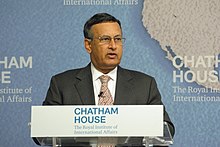
Back حسين حقاني Arabic حسين حقانى ARZ Hussein Haqqani German हुसैन हक्कानी Hindi Хаккани, Хусейн Russian حسين حقاني Sindhi حسین حقانی Urdu 侯賽恩·哈卡尼 Chinese
Husain Haqqani | |
|---|---|
 | |
| 24th Pakistan Ambassador to the United States | |
| In office 13 April 2008 – 22 November 2011 | |
| Preceded by | Mahmud Ali Durrani |
| Succeeded by | Sherry Rehman |
| High Commissioner of Pakistan to Sri Lanka | |
| In office 11 May 1992 – 28 June 1993 | |
| Preceded by | Tariq Mir |
| Succeeded by | Tariq Altaf |
| Personal details | |
| Born | 1 July 1956 Karachi, Pakistan |
| Citizenship | Pakistan |
| Spouse | Farahnaz Ispahani |
| Alma mater | University of Karachi |
| Profession | South Asia expert, journalist, diplomat, academic and political activist[1][2] |
| Website | http://www.husainhaqqani.com/ |
Husain Haqqani (حُسَین حقّانی; born 1 July 1956, alternately spelled Hussain Haqqani) is a Pakistani[1] journalist, academic, political activist,[2] and former ambassador of Pakistan to Sri Lanka and the United States.[3]
Haqqani has written four books on Pakistan, and his analyses have appeared in publications including The Wall Street Journal, The New York Times, Foreign Affairs, and Foreign Policy.{{[4]}}
Haqqani is currently a Senior Fellow and Director for South and Central Asia at the Hudson Institute in Washington, D.C., and co-editor of Hudson's journal Current Trends in Islamist Ideology.[5] He also is a Senior Research Fellow and Diplomat-in-Residence at the Anwar Gargash Diplomatic Academy in Abu Dhabi, which serves as a training institute for diplomats of the United Arab Emirates.[6]
Haqqani worked as a journalist from 1980 to 1988, and then as political adviser for Nawaz Sharif and later as a spokesperson for Benazir Bhutto. From 1992 to 1993 he was ambassador to Sri Lanka. In 1999, he was exiled following criticisms against the government of then-President Pervez Musharraf. From 2004 to 2008 he taught international relations at Boston University.[7] He was appointed as Pakistan's ambassador in April 2008, but his tenure ended after the Memogate incident, when the claim was made that he had been insufficiently protective of Pakistan's interests. A judicial commission was set up by the Supreme Court of Pakistan to probe the allegations against him. According to commission's report which was issued in June 2012, Haqqani was declared guilty of authoring a memo which called for direct US intervention into Pakistan, though Pakistan's Supreme Court noted that the commission was only expressing an opinion.[8][9] In February 2019, Pakistan's Chief Justice suggested the entire Memogate affair was a waste of time, saying that "Pakistan was not so fragile a country that it could be rattled by the writing of a memo."[10][9]
- ^ a b "The FP Debate: Should the U.S. Abandon Pervez Musharraf?". Foreign Policy. 26 November 2007.
- ^ a b Goldberg, Jeffrey (Winter 2014). "Ignorance, Meet Self Pity". Democracy: A Journal of Ideas.
- ^ "Haqqani presents credentials to Bush". Dawn. 7 June 2008.
- ^ https://www.foreignaffairs.com/authors/husain-haqqani
- ^ "Hudson Institute Biography". Retrieved 28 April 2023.
- ^ "Research Faculty & Staff". Anwar Gargash Diplomatic Academy. Retrieved 12 January 2023.
- ^ "Boston University Faculty Biography". Archived from the original on 20 August 2011. Retrieved 3 May 2011.
- ^ INP (12 July 2012). "Memo commission didn't declare Husain Haqqani traitor: Supreme Court". The Nation. Retrieved 16 April 2014.
- ^ a b Cite error: The named reference
:0was invoked but never defined (see the help page). - ^ Haseeb Bhatti (14 February 2019). "SC wraps up Memogate case, says govt should proceed against Hussain Haqqani if it so wishes". Dawn. Retrieved 14 February 2019.
© MMXXIII Rich X Search. We shall prevail. All rights reserved. Rich X Search